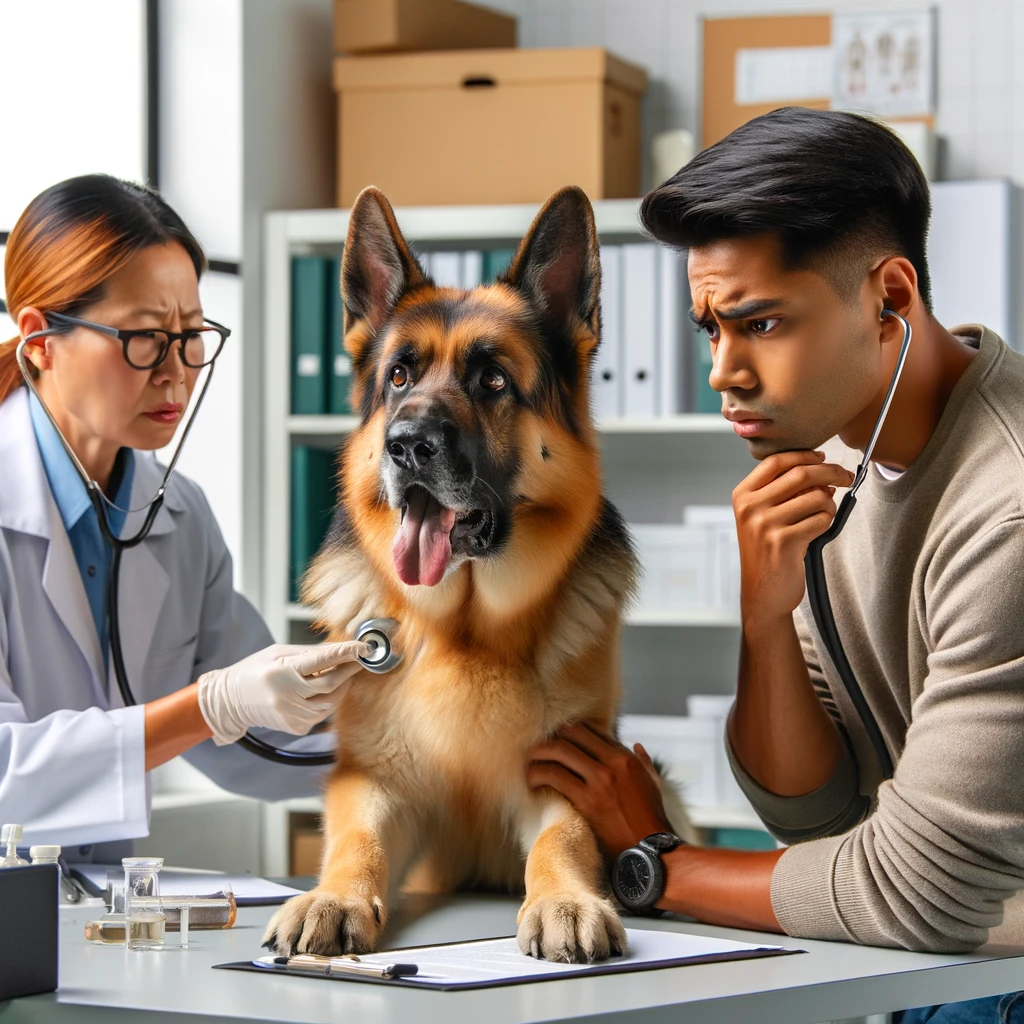Why is My German Shepherd Panting So Much?

Excessive or abnormal panting in your German Shepherd can indicate an underlying health issue that requires veterinary attention.
German Shepherds are prone to panting due to their active nature, double coat, and tendency to overheat. But, persistent heavy panting may signal your dog is in distress.
Introduction to German Shepherd Panting
The table below summarizes key points from “Why is My German Shepherd Panting So Much?”
It covers reasons for excessive panting, signs for veterinary attention, diagnostic methods, home care tips, and emergency care scenarios, offering essential guidance for German Shepherd owners.
| Section | Details |
| Introduction | Excessive panting in German Shepherds can indicate health issues; they are prone to panting due to their active nature, double coat, and tendency to overheat. Persistent heavy panting may signal distress. |
| Common Causes | Causes include exercise, stress or anxiety, pain or discomfort, heart problems, respiratory distress, diabetes, obesity, cancer, anemia, thyroid disease, and side effects of medications. |
| When to See the Vet | Veterinary consultation is advised for persistent heavy panting or panting with other symptoms. Emergency care is needed for nonstop panting, difficulty breathing, or bluish gums or tongues. |
| Diagnostic Tests | Tests include physical exams, blood/urine/thyroid tests, cardiac tests, imaging, respiratory diagnostics, endoscopy, and biopsies. |
| Reducing Panting at Home | Tips include ensuring hydration, providing a relaxed environment, avoiding strenuous exercise in the heat, using cooling methods, maintaining comfortable temperatures, administering medications, and monitoring respiratory rate. |
| Emergency Veterinary Care | Emergency care is required for rapid, continuous panting, difficulty breathing, abnormal gum/tongue color, collapsing, fast heart rate, and coughing up blood. |
| Chronic Panting Management | Management strategies include medications, supplemental oxygen, airway stents, chest drain, surgery, diet modification, exercise restriction, air temperature control, and humidity management. |
| Conclusion | Excessive or chronic heavy panting requires veterinary investigation. Attentive care and follow-up can improve breathing problems, but persistent severe respiratory distress may lead to difficult decisions about the dog’s welfare. |
Common Causes of Excessive Panting in German Shepherds
There are many reasons why your German Shepherd may be panting more than usual. Below are some of the most common causes to watch out for:
Exercise
German Shepherds love activity and exercise. It’s normal for them to pant during and after periods of high exertion to help cool themselves down.
Panting that lasts more than 10-15 minutes after exercise may indicate overheating or breathing issues.
Stress or Anxiety
Panting can also signify stress, anxiety, or fear in German Shepherds.
New situations, loud noises, unfamiliar people or animals, separation from owners, kenneling, vet visits, and more can trigger anxious panting episodes.
These are usually rapid, shallow breaths.
Pain or Discomfort
Your German Shepherd may pant due to pain or discomfort caused by injuries, arthritis, dental issues, gastrointestinal problems, menstrual cycles, and other medical conditions.
They cannot verbalize pain, so panting is a response.
Heart Problems
Rapid, relentless panting can indicate heart problems like defective valves, heart murmurs, enlarged heart, or heart failure.
Fluid buildup in the lungs makes breathing difficult. Heart disease requires prompt veterinary diagnosis and treatment.
Respiratory Distress
Respiratory illnesses like kennel cough, pneumonia, allergies, asthma, bronchitis, and obstructions in the airways can all cause wheezing, coughing, and heavy panting as your German Shepherd struggles to catch their breath.
Diabetes
Uncontrolled diabetes leads to excess thirst and urination, as well as heavy abdominal panting in dogs. Elevated glucose causes cellular starvation for energy.
The breath may have a fruity, sweet odor from ketones.
Obesity
Extra weight puts more pressure on the lungs and heart. Obese German Shepherds often pant with mild exercise.
Helping your dog slim down through diet and exercise can improve their breathing and quality of life.
Cancer
Certain cancers, growing abdominal tumors, can press on organs and lead to fluid buildup.
This compresses the lungs and causes strained panting. Loss of appetite and energy are also common symptoms.
Anemia
Low red blood cell levels reduce the blood’s oxygen-carrying capacity. Your German Shepherd may try to compensate for this oxygen lack by breathing faster and panting.
Anemia has many causes, including parasites, kidney issues, autoimmune disorders, etc.
Thyroid Disease
Disorders of the thyroid gland disrupt the body’s temperature regulation center, leading to excessive panting as your German Shepherd feels too hot or cold. Hypothyroidism and hyperthyroidism can cause this.
Medications
Some drugs, like corticosteroids, can trigger increased thirst, urination, appetite, and panting as side effects.
Contact your vet if your German Shepherd starts panting after starting a new medication.
When to See the Vet for Panting Issues
Schedule an appointment with your veterinarian if your German Shepherd’s panting seems excessive or abnormal for your dog.
Persistent heavy panting or panting accompanied by other symptoms warrants medical attention.
Seek emergency vet care if your German Shepherd is panting nonstop, cannot catch their breath, or has bluish gums or tongue.
These signs indicate oxygen deprivation. Immediate treatment is needed to prevent complications like organ damage or collapse.
Diagnostic Tests for Excessive Panting
To determine the cause of your German Shepherd’s heavy panting, the veterinarian will recommend:
- Physical exam – Check temperature, pulse, respiratory rate, mucous membrane color, capillary refill time, and lung auscultation.
- Blood, urine, and thyroid tests – Screen for infections, diabetes, kidney disorders, electrolyte imbalances, anemia, and thyroid disease.
- Cardiac tests – ECG and cardiac ultrasounds detect heart problems and screen lung blood vessels for clots.
- Imaging – X-rays, CT scans, or MRI of the chest and abdomen to visualize tumors, organ enlargement, and excess fluid.
- Respiratory diagnostics – Measure blood oxygen levels, lung capacity, and airway inflammation. It may require sedation.
- Endoscopy – Inserting a small camera into the airways lets the vet examine the mouth, trachea, and lungs for obstructions.
- Biopsies – Analyzing tissue samples of lumps or masses can determine if they are cancerous.
How to Reduce Panting at Home
While diagnosing the panting cause, try these tips to minimize your German Shepherd’s discomfort and respiratory distress:
- Ensure constant access to fresh, cool water – hydration is vital
- Provide a cool, shaded, well-ventilated area indoors and outside.
- Avoid strenuous exercise on hot, humid days.
- Use cooling mats, towels, and gentle fans.
- Bathe with cool water or allow them to swim if possible.
- Maintain comfortable indoor temperatures.
- Administer prescribed pain or anxiety medications.
- Massage throat and chest muscles.
- Monitor gum/tongue color – if bluish or white, seek emergency vet care.
- Measure resting respiratory rate – dogs’ average is 15-30 breaths/min.
When to Seek Emergency Veterinary Care
Bring your German Shepherd to an emergency vet clinic immediately if you notice:
- Sudden onset of rapid, continuous panting
- Inability to catch their breath
- Gums or tongue turning blue, gray, or white
- Collapsing or loss of consciousness
- Fast heart rate
- Coughing up blood or pink foamy fluid
These signs indicate a life-threatening issue requiring oxygen therapy and intensive care to prevent serious complications. Prompt treatment is vital.
Long-Term Management of Chronic Panting
For German Shepherds suffering from chronic medical conditions causing irreversible panting, several management strategies can help minimize symptoms and improve their quality of life:
- Medications – Diuretics, bronchodilators, steroids, and more to reduce fluid buildup, open airways, and control inflammation.
- Supplemental oxygen – Providing extra oxygen flow makes breathing easier.
- Airway stents – Expandable tubes help keep airways open.
- Chest drain – Allows drainage of fluid buildup around the lungs.
- Surgery – Removing obstructions and masses can improve breathing.
- Diet – Low-sodium food reduces fluid retention. Weight loss helps obese dogs.
- Exercise restriction – Limit activity to reduce respiratory effort.
- Air temperature control – Ensure their environment stays cool year-round.
- Humidity management – Use air conditioners and dehumidifiers to lower humidity.
With attentive home care and veterinary treatment, most dogs with chronic breathing issues can enjoy a good quality of life.
Persistence of severe respiratory distress requires an honest evaluation of their condition and prognosis. Euthanasia may be the most humane option if all treatment is ineffective.
Your vet can help you make this difficult decision. The goal is to preserve your German Shepherd’s comfort.
Panting Wrap-Up: Breathe Easy with Proper Care
While intermittent panting is normal, excessive or chronic heavy panting in your German Shepherd requires prompt veterinary investigation to determine the cause and guide appropriate treatment.
Allowing respiratory distress to persist compromises their health and welfare. With attentive care and follow-up, most dogs with breathing problems can breathe easier again and continue living with their beloved families.
Stay alert to any changes in your German Shepherd’s respiratory patterns, and do not delay contacting your vet if panting seems abnormal.
With your loving attention, you can help your furry friend breathe easy!

I’m Martin, and I grew up in the super cool city of Seattle. You know, the place with all the incredible mountains and forests? Yeah, that’s my playground!
Ever since I was little, I’ve been all about nature. I used to wander around the woods with a notebook, doodling all the cool plants and animals I’d find.
